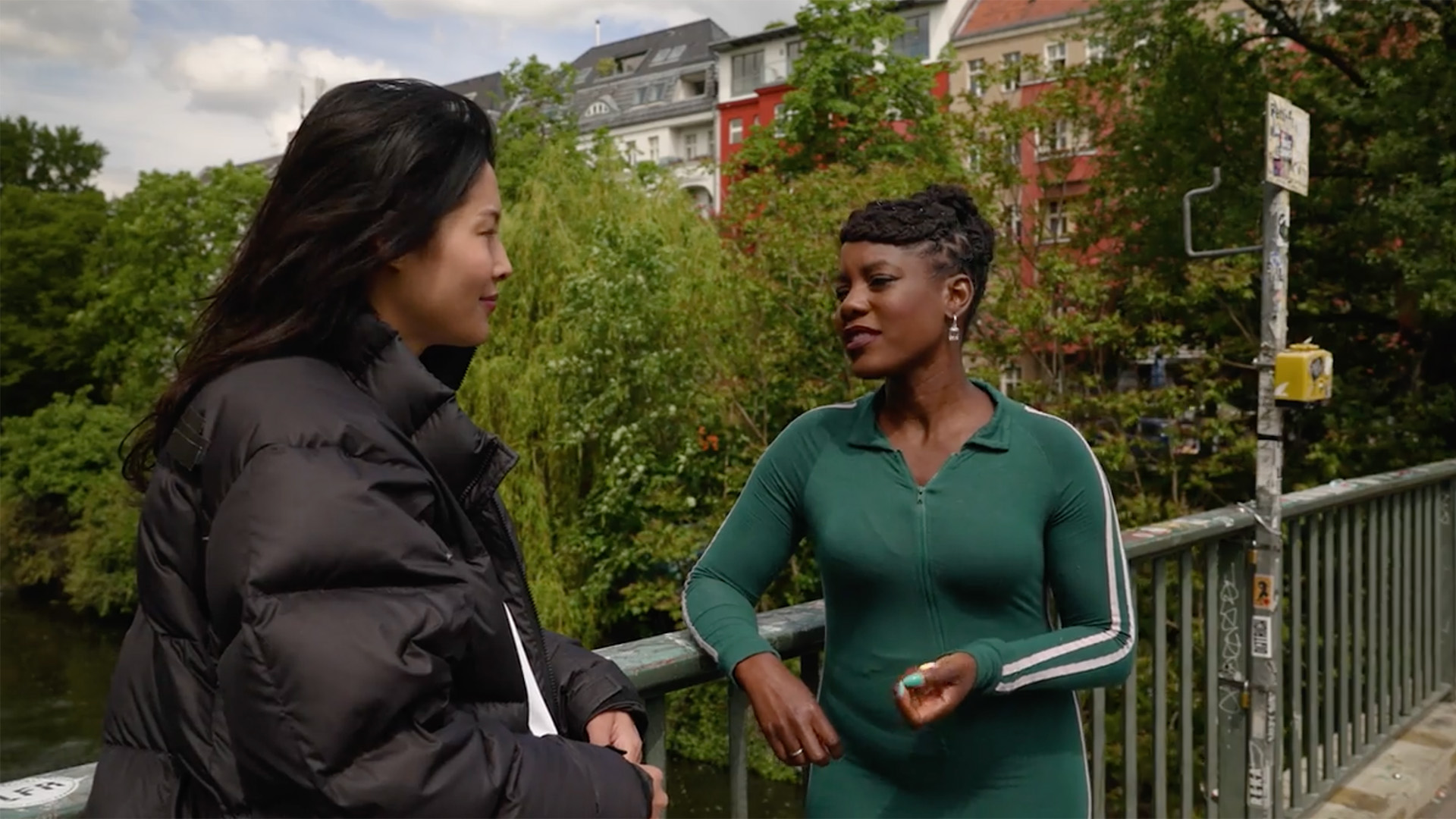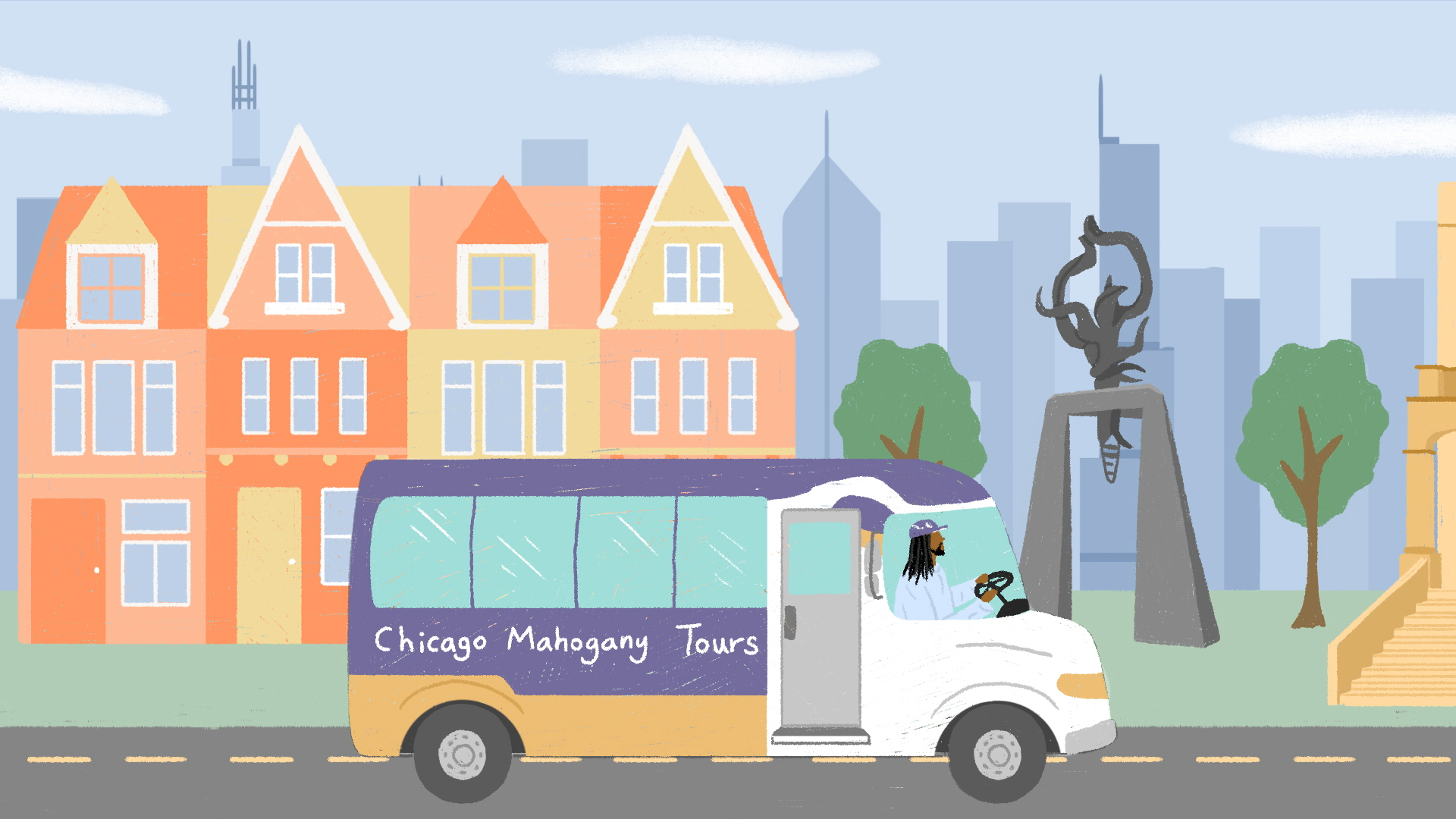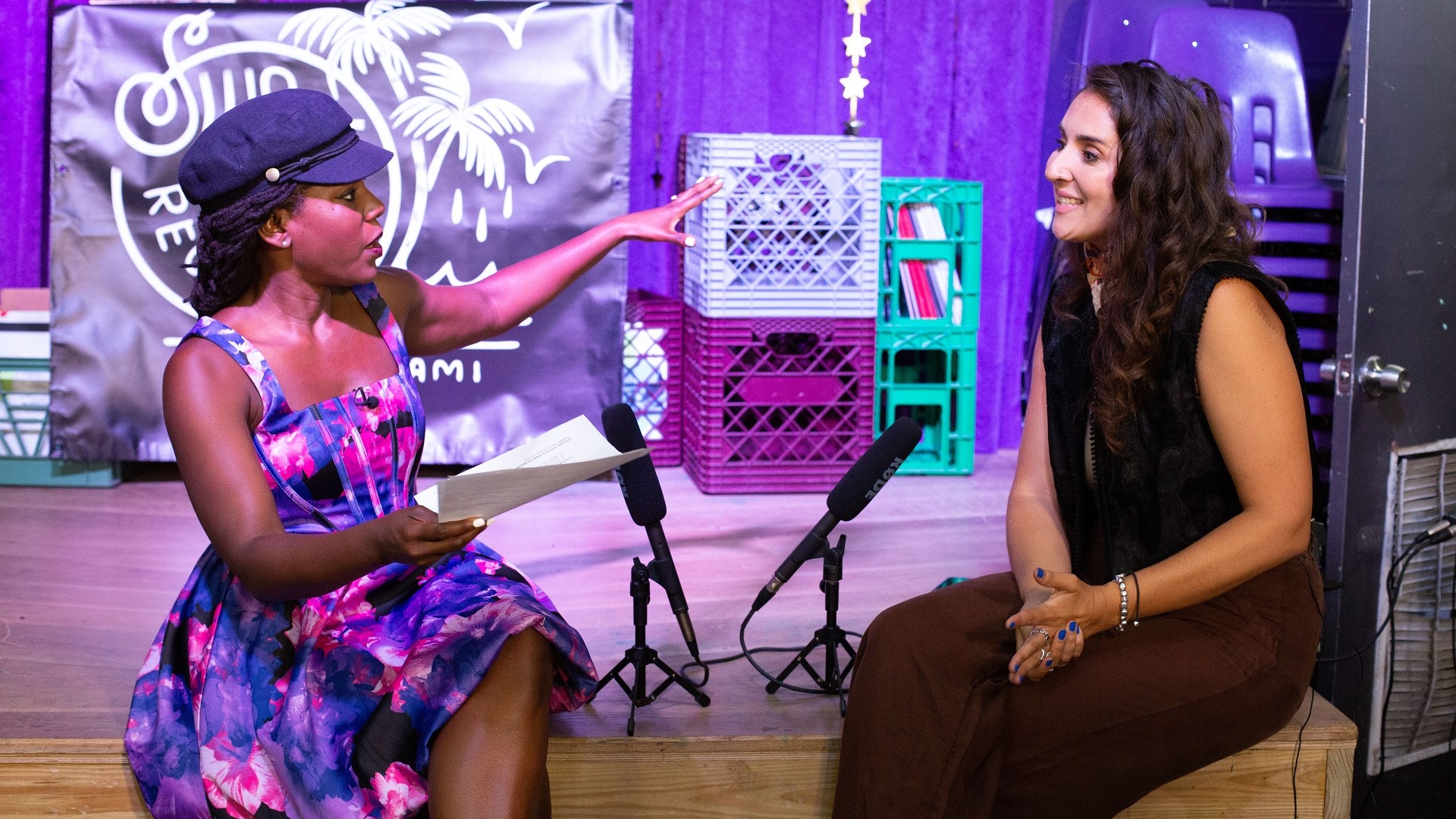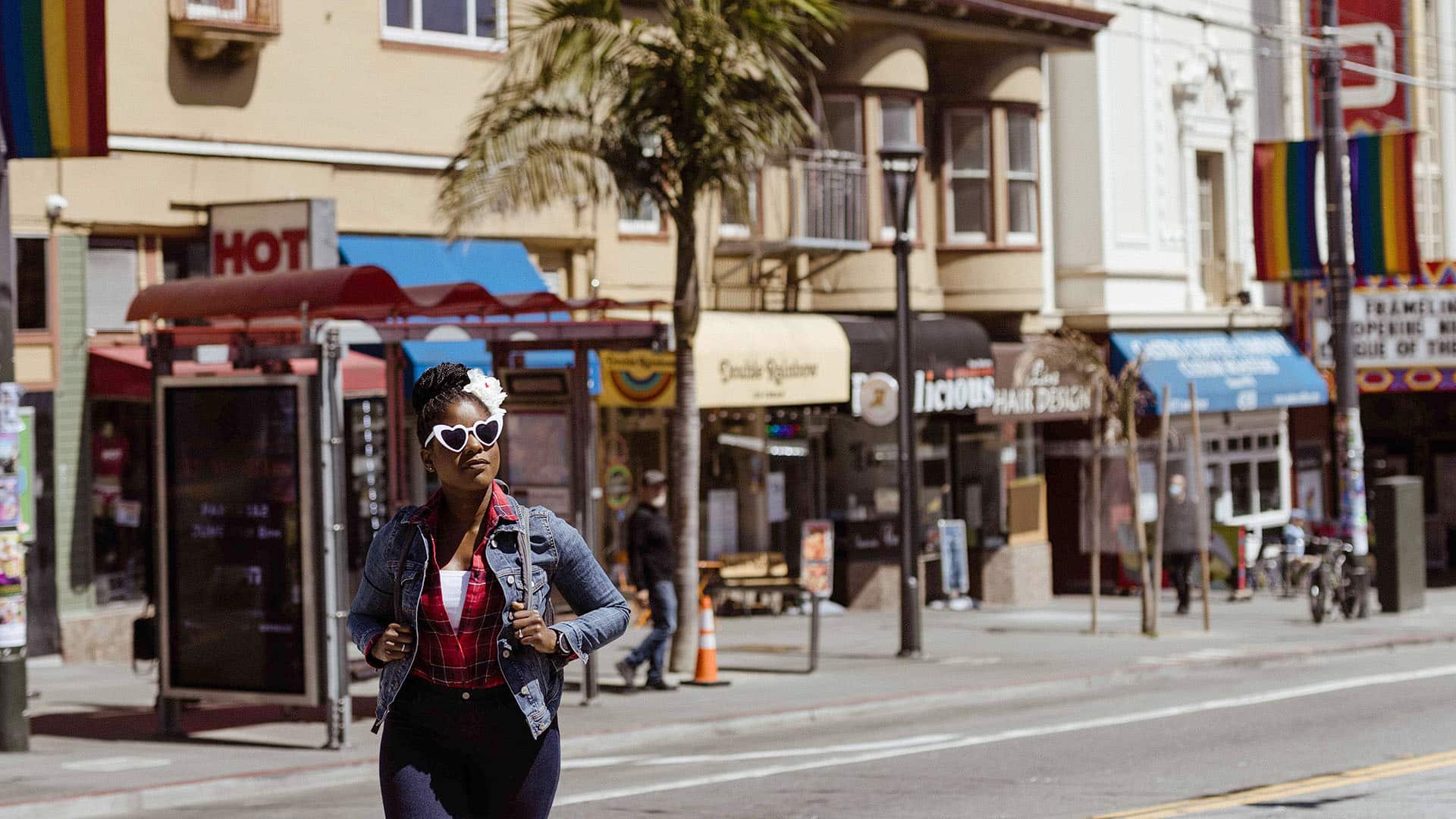
About the Journey Host, Oneika strolls through the streets of San Francisco, California. (Photo: Oneika Raymond)
About the JourneyEmbracing Queer History in San Francisco’s Castro District
By Taylor WoodyOneika Raymond walks Castro Street with filmmaker and drag performer Joshua Grannell (he/him) on their way to opening night of Frameline, the largest and longest running queer film festival in the world.
The Castro is a historic San Francisco neighborhood which first became known as a hub for the Gay Civil Rights Movement of the 1970s. Oneika meets up with Joshua, or Peaches Christ, outside Queer A.F., a queer arts space dedicated to keeping LGBTQ+ artists in the Bay Area.
It’s also the former site of Harvey Milk’s headquarters, Castro Camera. Joshua takes Oneika on a tour down memory lane as they stroll Castro Street’s Rainbow Honor Walk, pointing out notable figures like disco singer Sylvester along the way.
He reflects on how the neighborhood has changed since he moved to the enclave as an aspiring filmmaker in 1996, and points out one institution that continues to be a gathering place for the queer community: the famed Castro Theatre.
Oneika and Joshua continue their conversation at Orphan Andy’s, a rainbow-themed greasy spoon that has been serving up late night eats since 1977. There, she learns more of the lesser-told history behind the city’s queer neighborhoods, like the newly legally recognized Transgender District in the Tenderloin.
Joshua also shares how he got his start as a drag queen, and why the Castro was the perfect neighborhood for him to foster that self-expression and launch his show, Midnight Mass.
Of course, there are countless drag performances to choose from across the city, be it brunch at El Toro, cabaret at the Oasis, or seasonal shows at W San Francisco.
They’ll wrap up the day by heading to the red carpet at Castro Theatre for Frameline to see the reboot of ‘A League of Their Own’ – and witness that cinematic magic come to life in the audience.
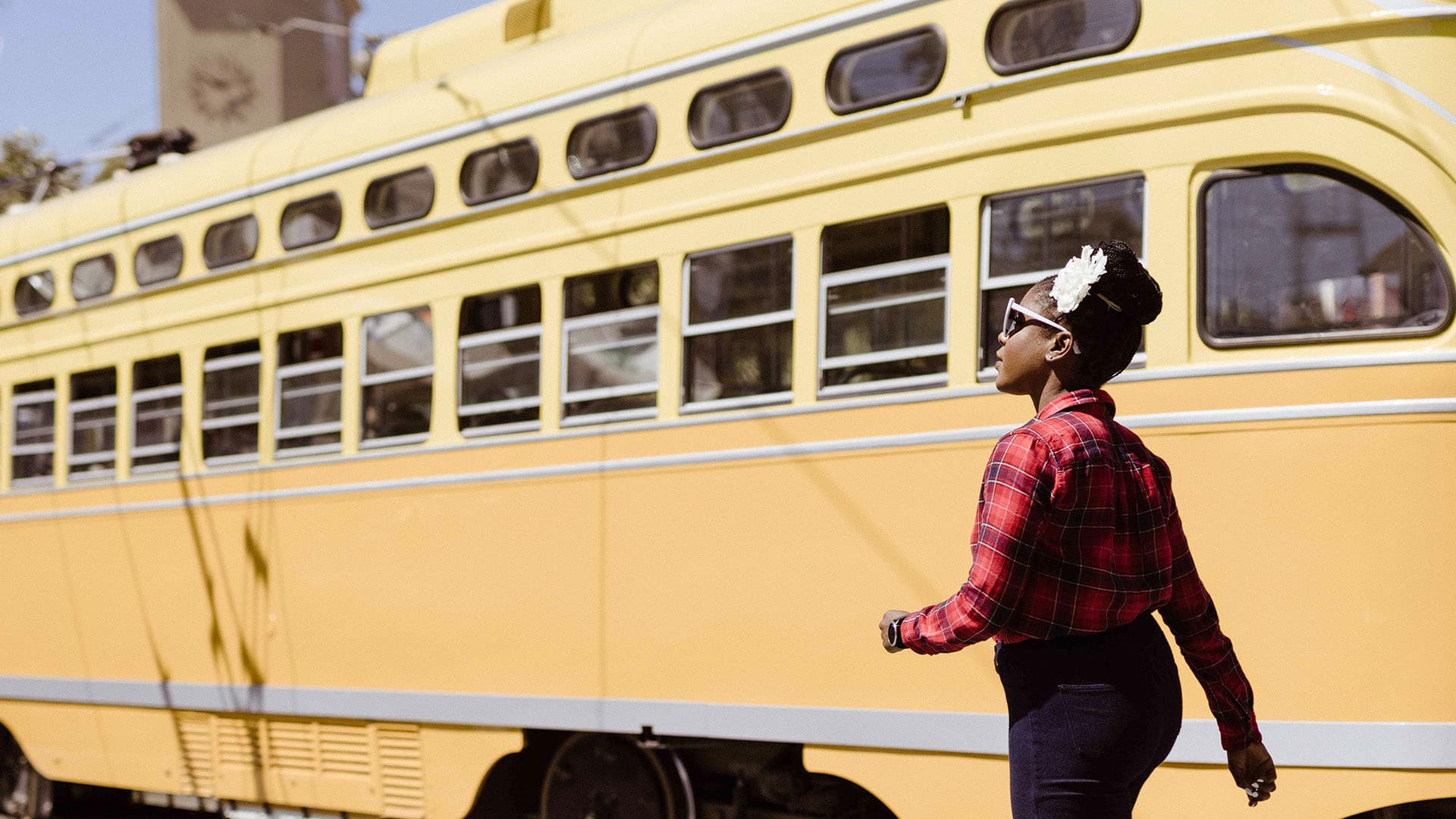
PODCAST EPISODE TRANSCRIPT
Joshua Grannell: That’s your street car.
Oneika Raymond: That is my street car.
Joshua Grannell: There you go.
Oneika Raymond: A little piece of home in San Francisco, which attests to the fact that, you know, come as you are, you are accepted. Look, I’m looking at my childhood right here in the Castro.
Joshua Grannell: Well, I mean it doesn’t get much more charming than actually having functional street cars…
Oneika Raymond: Welcome to About the Journey. I’m Oneika Raymond, a travel journalist and member of Marriott Bonvoy. For each episode of season two, we’re exploring what it means to travel better. And this week, we’re doing it with the help of a local celebrity Joshua Grannell, an independent filmmaker and drag performer known as Peaches Christ.
Oneika Raymond: If you could describe it in, let’s say three words, which ones would you choose?
Joshua Grannell: Okay. Three words, obviously, queer, creative, liberating.
Oneika Raymond: Hmm. I love that. It makes me wanna come out here. Oneika Raymond: These three words ring true across San Francisco. And while we’re spending time in the Castro today, Joshua – whose pronouns are he/him – encourages you to be a curious visitor.
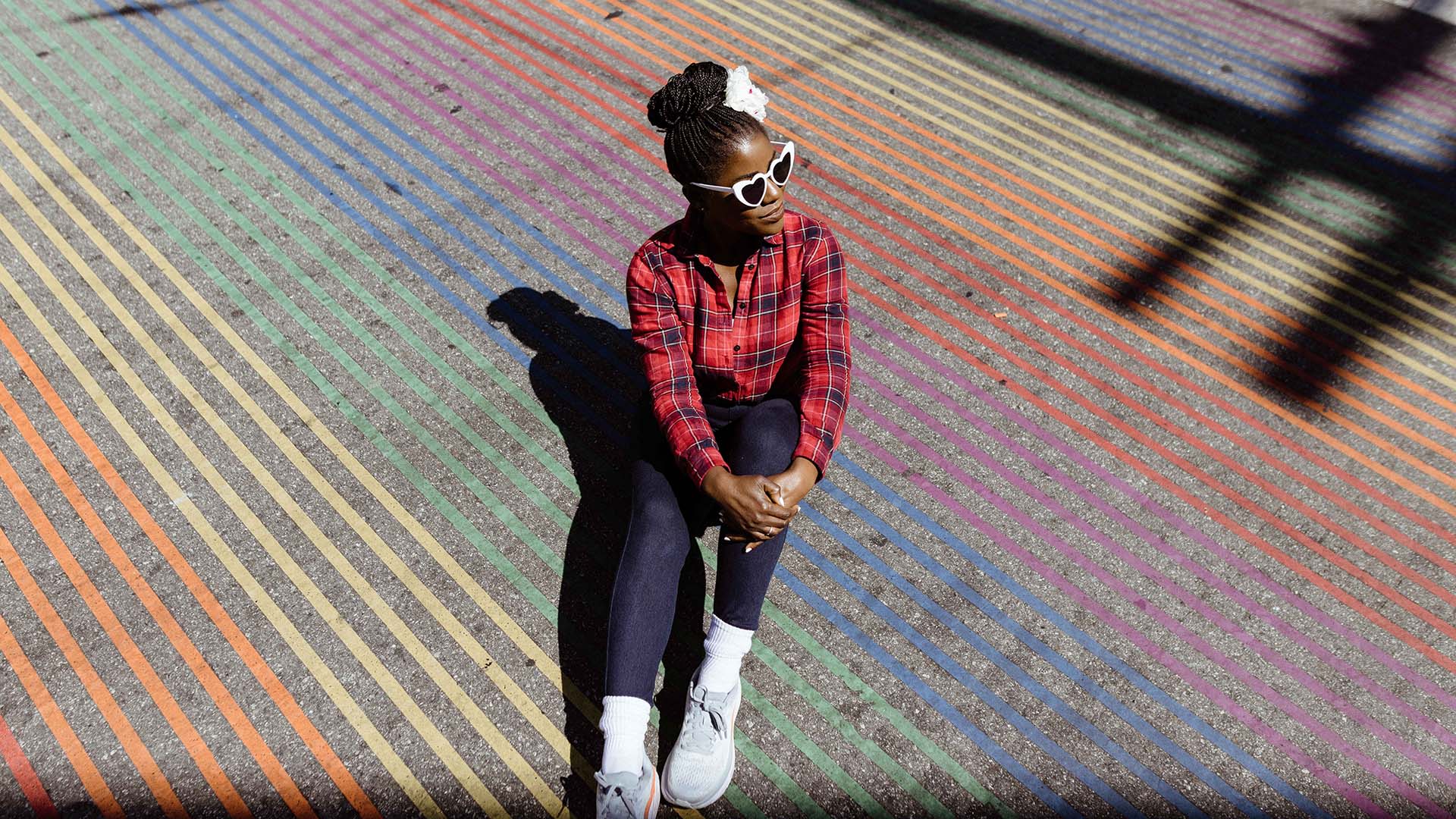
Joshua Grannell: Explore the neighborhoods. Go out to the avenues. Go to. like really far out by the beach and, and have dinner at a Thai restaurant that only does crab, like have a Burmese meal, you know, go see a movie at the Castro theater, go see a show at the Oasis.
Oneika Raymond: Get off of the top 10 lists.
Joshua Grannell: Exactly
Oneika Raymond: And dig a little bit deeper.
Joshua Grannell: Yeah, yeah, yeah.
News Clip: Castro village, the name given for roughly 20 square blocks of quaint shops, vaguely Victorian structures cut into living quarters and more than 15 gay bars. All nestled into a cozy hodgepodge of unplanned happiness at the foot of twin peaks.
Gale: …and then Oneika is in the flannel.
Joshua Grannell: The flannel?
Gale: Yes.
Oneika Raymond: We’ve made our way to the Castro. My producer Gale spots Joshua first and points him in my direction.
Gale: For this lovely weather.
Joshua Grannell: Yep. Welcome to San Francisco summer.
Oneika Raymond: It’s a sunny day in the Castro but a ferocious wind sends every pride flag dancing outside the many restaurants and storefronts.
Joshua Grannell: Hi. How are you?
Oneika Raymond: It’s lovely to meet you.
Joshua Grannell: You too..
Oneika Raymond: Oneika.
Joshua Grannell: Love to meet you, Oneika.
Oneika Raymond: Thank you so much for agreeing to chat with us.
Joshua Grannell: Absolutely. It’s a little windy.
Oneika Raymond: It’s a little windy.
Joshua Grannell: Yeah.
Oneika Raymond: Yeah. But You know, that never hurt anybody.
Oneika Raymond: Standing over 6 feet, Joshua is even taller than I expected. His faded black graphic tee, bleached hair, and jean jacket give off goth vibes.
Joshua Grannell: This, this is, the actual, camera shop. Well, it’s not a camera shop anymore.
Oneika Raymond: We’re in front of an unassuming storefront. It’s the home of Queer AF, a queer arts space dedicated to keeping LGBTQ+ artists in the Bay Area. But if you crane your neck up, you’ll see an illustration of a man looking out a window.
Joshua Grannell: Back at the beginning of the gay civil rights movement, Harvey Milk owned this camera shop here. And so this actually became his campaign headquarters.
Archival News Clip: …as political parades go, it was a little unusual. Harvey Milk on his way to city hall to be sworn in as a supervisor in San Francisco. At his side, his gay lover.
Oneika Raymond: San Francisco politics were turned upside down in 1977, the year Harvey Milk became California’s first openly gay elected official. The Castro was a center for organizing and a safe haven for the gay community. It’s been through a lot of changes since Joshua moved here — from the AIDs crisis to the pandemic — but the heart of it remains.
Oneika Raymond: And so you moved here in ’96?
Joshua Grannell: Yes. I moved here in 96 and um, and many, many ways the neighborhood looks very similar. In a lot of ways, it looks very different, you know, it depends on…
Oneika Raymond: Yeah. I’m curious as to how it’s changed.
Joshua Grannell: So when I moved here, this neighborhood was kind of a dark place. You saw a lot, a lot of sick people. There was a sadness to people because they’d been dealing with this tragedy for over a decade, you know? But once that cocktail started to come out and they got into the hands of people and people started to live again, the later 90s really shifted. It was a really exciting time to be here and the neighborhood kind of came back to life.
Oneika Raymond: And what about the businesses?
Joshua Grannell: I mean, there’s lots of stuff that’s come and gone. At one point, right down here on the right, there was actually a museum dedicated to Barbara Streisand.
Oneika Raymond: Oh, wow.
Joshua Grannell: That was here when I moved. And the owner, obviously a huge Barbara Streisand fan, was so pissed off that she never came to visit that he basically closed it saying she…
Oneika Raymond: How dare she?
Joshua Grannell: Right. I mean, but would you? Oneika Raymond: As we walk up Castro Street towards Orphan Andy’s, Joshua points out establishments that have roots as deep as his own in San Francisco.
Joshua Grannell: Well there’s Harvey’s, which sits on the corner, and that was new when I moved here. Badlands, which is next door, was actually already here. A lot of the bars are the same.
Oneika Raymond: Some institutions have come and gone due to the passing of time. Others due to the changing economics of the city at large.
Bill Pung: The neighborhood’s really a different, different beast back then, you know, more vibrant, you know, a lot, lot of activity and more retail storefronts, you know, it’s kind of a roller coaster ride.
Jose: Castro is really quiet after 11 o’clock. Never used to be.
Chris: I mean, that’s the biggest change that’s hit in all of the neighborhoods is how expensive it is. But it’s also the same, you know, filled with good people trying to, trying to live their good lives.
Oneika Raymond: So do you feel as though, even though the demographics of the neighborhood have changed…the economics of the neighborhood, some of the iconic businesses have gone…do you still feel as though there’s a sense of community?
Joshua Grannell: I don’t necessarily think it’s lessened. I think it depends on when you’re here and what’s happening.
Oneika Raymond: I see
Joshua Grannell: That was my bedroom window
Oneika Raymond: Wow.
Joshua Grannell: Yeah, so it for example, when the George Floyd murder happened, this was ground zero for gathering. And the queer community just came out en mass immediately.
Oneika Raymond: I love that.
Joshua Grannell: The community is still very strong here.
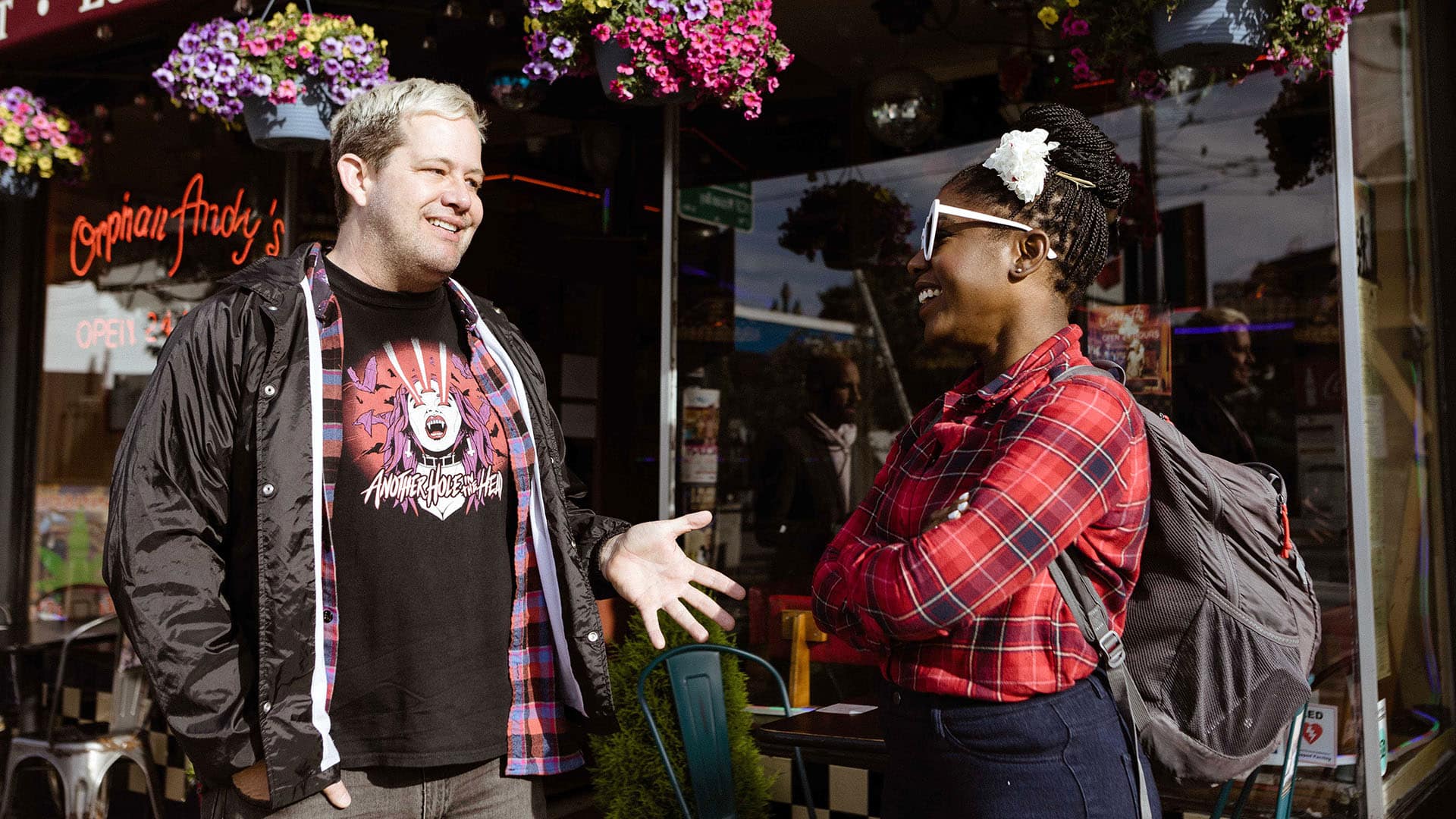
Oneika Raymond: Case in point, when we arrive at Orphan Andy’s, the owner, Bill Pung, is quick to remember Joshua.
Joshua Grannell: Hey, hi. How are you?
Bill Pung: Good.
Joshua Grannell: I haven’t seen you in a while.
Bill Pung: Yeah.
Joshua Grannell: How are things?
Bill Pung: Yeah. Good, good. We’re hanging in there.
Joshua Grannell: Good. Well, you need to do a documentary about Orphan Andy’s.
Oneika Raymond: Always the filmmaker, talking with Bill gets Joshua’s wheels turning about the diner, a Castro institution. Bill and his business partner slash husband, Dennis Ziebell, have served up french toast and fries to night owls since the year Harvey Milk was elected supervisor. Today, it’s bustling thanks to PRIDE. We step inside and continue our conversation in a window booth overlooking 17th Street.
Oneika Raymond: Can you tell us a little bit about the spot – why it’s significant?
Joshua Grannell: Well, I personally love Orphan Andy’s. I love food. I love diner food and I love queer culture. It’s a great place. I mean, it’s so San Francisco. It’s so unique. Like you can get a cheeseburger here with a slab of Philadelphia cream cheese on it, and a slice of pineapple, you know, and it’s good.
Oneika Raymond: Right? Right. Very, very, very nice. And of course we talk about all of the fun times that you’ve had here, all the memories that you’ve had, in the neighborhood at large, I mean, we’re in the Castro. You know, when we talk about queer rights and when we talk about this area, obviously has a lot of historical significance. I look at some of the iconic figures that are constantly mentioned, you know, Milk, for example. And it feels as though the community – and the movement at large – is very centered around white, cis, gay men.
Joshua Grannell: Mm-hmm
Oneika Raymond: Right. Do you feel as though the community has become more inclusive? Do you feel as though more work needs to be done in order to be more inclusive?
Joshua Grannell: Uh, I think it depends on what perspective you’re really looking at. There has been this acceptance in San Francisco that should be celebrated. But the Castro specifically has historically been white and male, and that is very true. The city, in general, has a wider diversity around queer expression. So I think it’s, it is both actually. And the Castro, in many ways, was very much called out by a genius Black gay filmmaker in the 80s – his name is Marlon Riggs. Marlon Riggs lived in the Castro and made a movie called Tongues Untied. And that movie addresses exactly what you’re talking about and it’s his experience being in – and I forget how he says it – but kind of a sea of whiteness, you know? And I think a lot of white people had to be told, like, look around you’ve got privilege. You’re being exclusive. There’s elitism here. There’s, you know, part of the privilege is not knowing you have it.
Oneika Raymond: Yes.
Joshua Grannell: You know? So, yeah, he was really instrumental in shifting things and what I’ve seen over the years, honestly, because I lived in this neighborhood, is that there has been a change and there has been some reluctance to embrace that change.
Oneika Raymond: I think so often we have blind spots…
Joshua Grannell: Mm-hmm.
Oneika Raymond: …right? – that are unintentional. But they are indeed blind spots. And so it’s important for us to recognize them and move on and think about how we can rectify and how we can adjust and make a really positive shift.
Oneika Raymond: When we were walking up Castro Street earlier, Joshua and I stumbled on a plaque in the sidewalk memorializing a local legend.
Oneika Raymond: So we are actually on the Rainbow Honor Walk, and it kind of resembles I guess the Hollywood Walk of Fame.
Joshua Grannell: Yeah, it does.
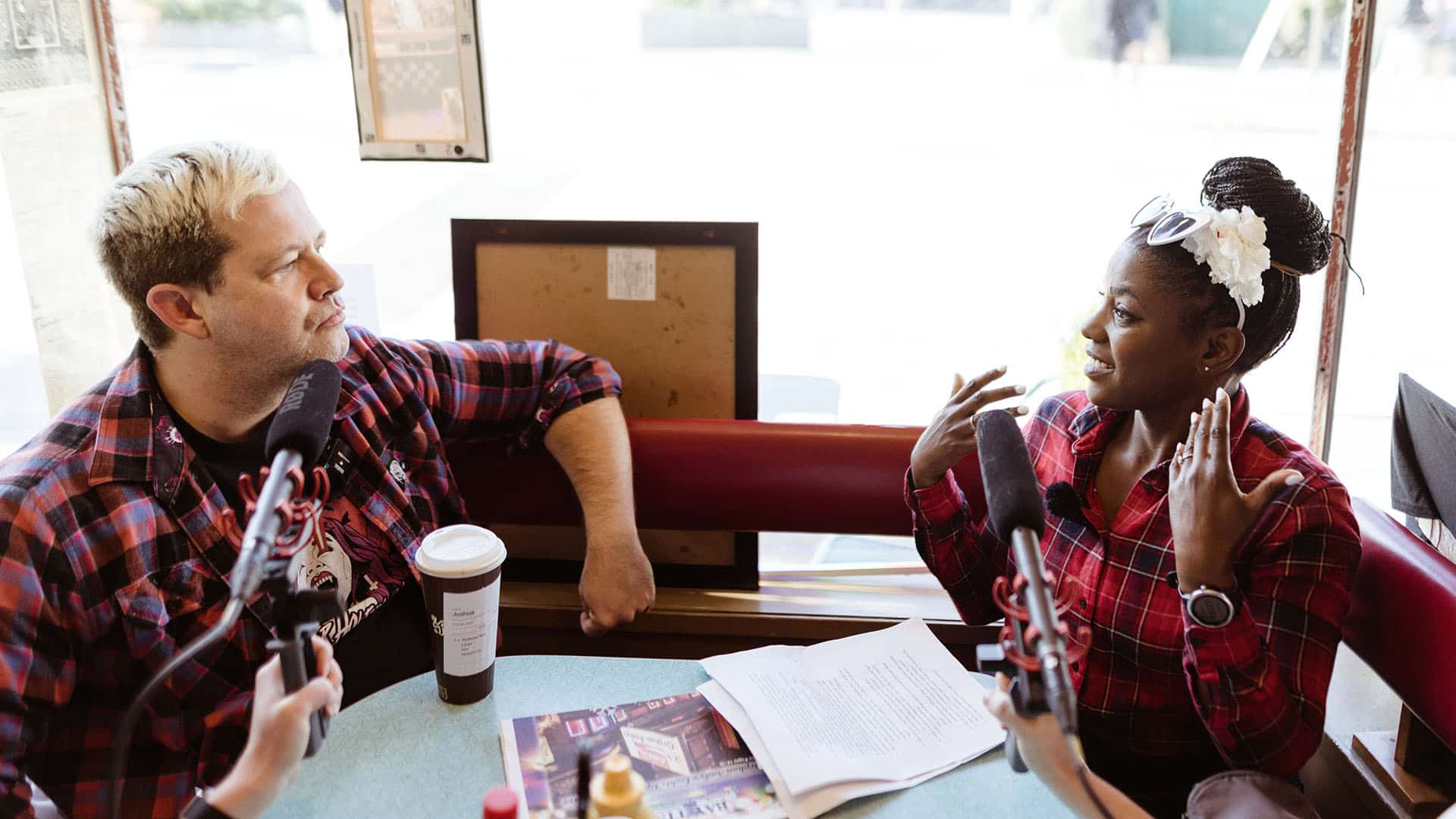
Oneika Raymond: And so we have like these panels and, they’re honoring notable figures in the LGBTQ+ community, and Sylvester is one of them.
Joshua Grannell: Yeah, so Sylvester was the disco singer who often performed in drag and was a member of the Cockettes in the late 60s, 1969 – a hippie drag commune. Did shows at the palace theater in north beach, which is really where I got the inspiration to do my shows. They were in movie theaters. They were at midnight. And Sylvester was one of their regular performers. Sylvester, of course, ended up becoming a huge breakout star, you know, appearing on all the big TV shows. This is pre-Rupaul.
Joshua Grannell: This was a big deal because he would perform in drag, like on the Tonight Show appearing with Joan Rivers, you know, and
Oneika Raymond: Wow.
Joshua Grannell: His song Mighty Real is still played, you know, everywhere.
Oneika Raymond: So crossing into the mainstream.
Oneika Raymond: Tell me more, more about you.
Oneika Raymond: Tell me more about you. So where did you grow up?
Joshua Grannell: I was born in DC and I grew up in Annapolis, Maryland, um, where I was a kid who went to Catholic school and, you know, it was very boring and very – how should I say this? – preppy. And I was none of those things. I wanted to live in the city. I was a weirdo. I loved horror movies. I was a goth kid. I was, you know, I was always attracted to the other underdogs. Those were my friends. So I just kind of always knew that I had to get the hell outta Maryland.
Oneika Raymond: And Joshua did just that. He found his people and realized his creative potential in San Francisco. You might have spotted his 2010 cult film starring Natasha Lyonne, All About Evil. But what he’s best known for is his drag persona, Peaches Christ. She’s a horror loving queen who routinely sells out all 1407 seats at the Castro Theatre for an event called Midnight Mass.
Joshua Grannell: I basically went to the company here, Landmark Theaters and said, I want to do a midnight movie series with my drag queen friends and host it as Peaches. And I created a different show every week before these screenings. And that show evolved over the years. It got bigger and better, and we started selling out nights. And so, the show could take the form of sketch comedy. It could take the form of a contest. Then we started inviting the actual celebrities from the movies, and I started to befriend the celebrities. And then, you know, by putting one foot in front of the other, it got bigger and bigger and bigger. And now, it’s a big movie celebration that takes the form of a giant stage show acted out by drag performers.
Oneika Raymond: Mmm. Held at the Castro theater?
Joshua Grannell: Held at the Castro Theater, and then beyond.
Oneika Raymond: Midnight Mass isn’t the only drag show in town. Far from it. On any given night in the city you have your choice of drag performances, be it brunch at El Turo or cabaret at the Oasis. They’re even often at W San Francisco, my hotel.
While modern day drag as we know it has its roots in Harlem, there’s no denying San Francisco’s influence on the culture — and it on SF’s history. The city’s first well-known drag queen is cited as José Julio Sarria, who performed at a gay bar called Black Cat in the 1950s. He later became the first openly gay candidate for public office in the United States. His legacy as a gay Latino leader, activist, and drag queen helped pave the way for politicians and performers alike.
Oneika Raymond: Joshua sees a lot of hope in the changes that have sprung from the queer community over the years.
Joshua Grannell: I guess if I were in college today, I’d probably identify as non-binary because my expression in college, I would wear lipstick to class and barettes, and you know, was much more of a gender androgynous presenting person. And then I discovered drag, and I started to do drag and having Peaches was like this, this other creative outlet where I got to express this part of myself. It’s not just a performance. Part of me is feminine. Part of me, I identified as a child as not being all-male or a boy or a man, you know? So Peaches, for me, I’m not impersonating a woman. I’m actually impersonating an idea of myself (laugher). Or what this, this weird glam-azon creature that was inside of me. So it’s an expression.
Oneika Raymond: Yeah. You know what I find really interesting. I find…it’s almost like now that we have the vocabulary…
Joshua Grannell: Yeah.
Oneika Raymond: …people can, like, fully express themselves. Like it almost – not gives permission – I guess it, it gives a label or a name to this thing that you knew about. But I, I feel like it’s more prevalent now to be non-binary just because we have the language for it.
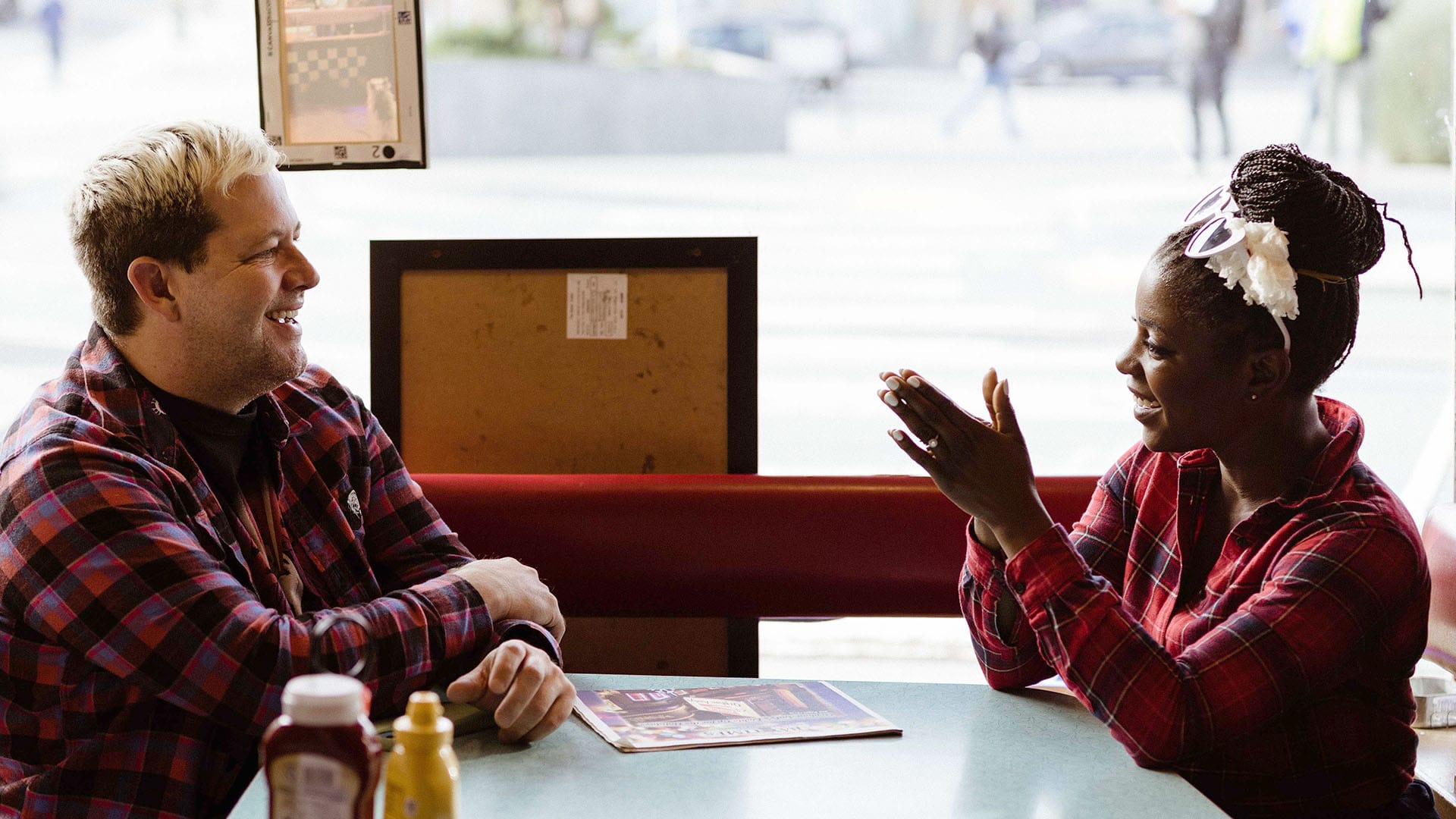
Joshua Grannell:. I mean, I’ve always been friends with and known people who are non-binary. We just didn’t have the word for it – because we’re older. We didn’t use ‘they’, ‘them’. And so it’s interesting now that a younger generation has kind of shifted. So it’s like, this has always been here. It’s always been part of us, but now I love what they’re doing, because what they’re saying is we’re gonna destroy this.
Joshua Grannell: We’re gonna take it apart, period.
Oneika Raymond: Yeah, yeah.
Oneika Raymond: We were talking a lot about the Castro being like an epicenter or very important center for the LGBTQ plus community here in San Francisco. What are some other neighborhoods?
Joshua Grannell: Certainly what’s called Soma, which is South of Market, is very important because that’s really the Leather District. And historically now it’s been recognized by the city as the Leather Cultural district. South of Market became where, you know, the Eagle and the Powerhouse and these sort of…I, I think of it as drag in a lot of ways. You know, but that’s where the Folsom Street Fair happens and it’s the largest international kink and leather fair in the world.
One other notable, I think very notable, piece of San Francisco history right now is that we now have the first ever transgender cultural district in the city, which my friend, Honey Mahogany, actually made happen. You know, here’s a drag performer who went on RuPaul’s Drag Race – this is so San Franciscan – and instead of becoming, the queen that tours the world and does these big, epic events…and, you know, of course she did some of that and she’s been in my shows, but Honey said, “Well, before I went on RuPaul’s drag race, you know, I was a social worker and I want to use my platform to make a difference.” And so now Honey Mahogany is literally running for Supervisor. She just announced her campaign as Honey Mahogany, an out trans-identified drag performer. But she was the person who basically got it pushed through City Hall to Designate a part of the Tenderloin as the transgender cultural district, because it’s where The Compton’s Cafeteria Riots happened and it really changed things in San Francisco.
Oneika Raymond: I want to take a moment to share a bit of this history because I knew nothing about The Compton’s Cafeteria Riot before sitting down with Joshua. And this is all too often the case when it comes to the work of transgender people, particularly transgender people of color.
It was an August evening in 1966, three years before the Stonewall riots in New York. That night, transgender women, drag queens, and other members of the queer community rose up against years of police brutality in the Tenderloin. Despite the progress it sparked, the riot went unreported in the news, and as time went on, the dominant narrative in the LGBTQ+ movement favored that of the cis, gay man.
But in 2017, three Black trans women founded the Transgender District, recognizing the Tenderloin as a documented home for transgender folks since the 1920s. It’s the first legally recognized cultural district of its kind, and helps to rewrite the queer community’s fight for equity.
Oneika Raymond: Films can also play a powerful role in telling honest, varied stories of what it means to be queer. And San Francisco is home to a hundred year old theatre that has been the launchpad for many of these films.
Joshua Grannell: The Castro movie theatre, which is like the centerpiece business of the neighborhood. It’s the cultural epicenter of this neighborhood — really represents something for the queer community around the world. Part of it is because queer film festivals have been a real gathering place for our community, because we were not seeing ourselves represented in other movie theaters and, you know, on television. And our stories weren’t being told. Or, if they were being told, you know, we were presented as people to be afraid of. So, you know, the Frameline Film Festival, which started at the Castro Theater decades ago, ended up becoming this incredible, uplifting, empowering, festival where so many of us just gathered to see our stories told. But beyond that, the Castro Theater was a repertory theater for many years. And so it had professional film programmers who were programming movies for this community. So these repertory films, as a young queer person moving to San Francisco, finding out from an older queer person, oh, they’re screening anti Mame. you need to go see Auntie Mame.
And I remember discovering Cheryl Dunay, who’s a black lesbian filmmaker who made a movie called The Watermelon Woman. Cheryl and I are friends to this day, but The Watermelon Woman was programmed at the Castro Theater for like two weeks! Nowhere else – I mean, I’m sure she had a festival run, but it wasn’t distributed. So it was a place for our community to gather, you know, it was kind of like our church.
Oneika Raymond: Right? I mean, we always talk about movements and I mean, movements spring forth from exclusion, from, disenfranchisement, they’re seeking, an arena, in which their needs are being met, in which they are being seen and heard and, having to basically rally and gather and provide a safe space for your needs, interest, creative pursuits – or what have you – to be exalted and uplifted.
Oneika Raymond: For the last 46 years, the queer community has gathered at The Castro Theatre for Frameline’s International LGBTQ+ Film Festival. It’s the largest and longest running queer film event in the world. And filmmakers and movie-goers alike have a special affection for it.
Tyger: 1, 2, 1, 2 testing, testing, testing.
Alexis: Well, I think it’s just an opportunity for all the people who are queer to finally see them themselves on the big screen. And it’s just the opportunity to finally see yourself in real life, I guess.
Chris: You feel like you’re, you know, sitting with your biggest group of friends, even though you may not know anyone there or not. I think the quality, the quantity and the diversity of what they offer is pretty special.
Tyger: I’m excited about hearing laughter – community laughter, you know. I’m excited for seeing queerness on screen – big, large. It’s been a while, you know.
Oneika Raymond: Alright. You’ve mentioned Frameline.
Joshua Grannell: Yes.
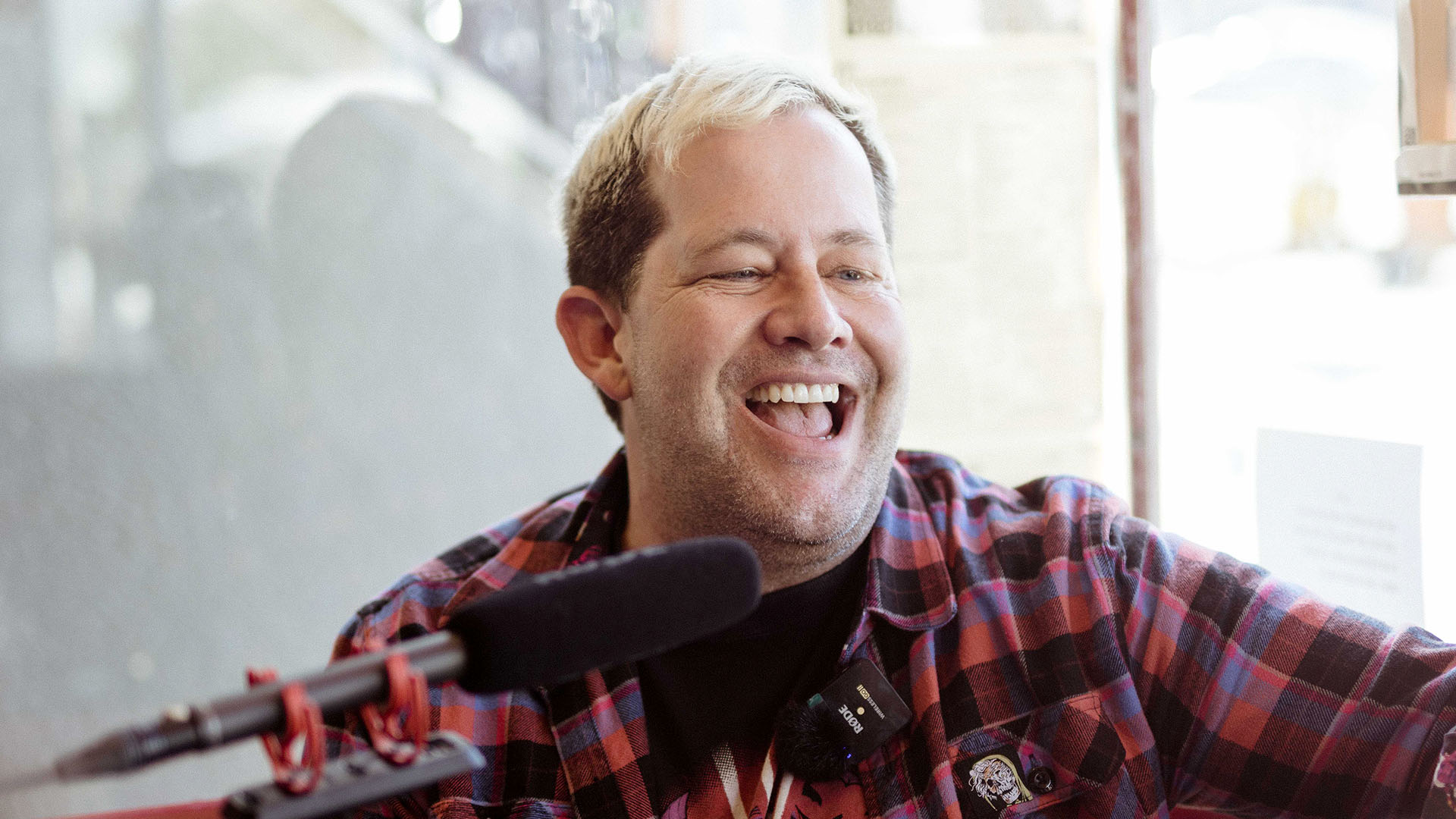
Oneika Raymond: Tell us, tell us more about it.Joshua Grannell: Well, the Frameline Film Festival is, you know, in my mind, the best film festival in the world, and I’ve been lucky enough, as a filmmaker, to go to many, many, many festivals, including Sundance, including Cannes, including Toronto – like the big ones – but nothing, to me, compares to the Frameline Film Festival. And that in large part is due to the spiritual connection that a community experiences watching films with like-minded community members that empower us, that tell our stories, and doing it in a place that has historical significance – you know, 1400 queer people – I remember one of my favorite screenings…
Oneika Raymond: Joshua recounts being at Frameline the day California Prop 8, a state amendment banning same sex marriage, was overturned.
Archival news clip: Woo. Happening right now, celebrations are still underway in San Francisco’s Castro District tonight.
Archival news clip: And out here live this evening. It is a celebration. It is a party…
Joshua Grannell: …so when I walked out of the theater, there was a massive swelling of like the streets, just filled up. You know, that kind of experience, I’ve never had that at any other festival. Where the movie you see on screen is happening outside the doors. You know what I mean? Like, the next chapter to that film is what was happening in the streets.
Oneika Raymond: Wow. So it’s clearly…clearly Frameline is very significant to the community. So tell me, what are you looking forward to tonight at the screening?
Joshua Grannell: Just being at the Castro Theater with that audience and, and sort of seeing, you know, Frameline, start back up again and that feeling of watching a movie in a movie theater with a bunch of people, you know. And because it’s this film festival that I love so much, there’s this specific feeling to it that…it’s hard to describe.
Oneika Raymond: I guess it all comes back to the community at the end of the day.
Joshua Grannell: Yeah. I mean, I created a show called Midnight Mass, right? I’m Peaches Christ. So I know it sounds tongue in cheek, but I actually really mean that for me, there is a spiritual component. There is a sense of fellowship around being with a group of people in a movie theater and celebrating ourselves, together. And, you know, I was raised a certain way and, and that community said, “Actually, no, you’re not welcome here, and you’re a sinner,” and so this is where I find community.
Oneika Raymond: I love that. Well, I guess we could head over there.
Oneika Raymond: We step out of the diner into the windy evening. The line for opening night of Frameline snakes its way up Castro street and around the corner. It’s the San Francisco premiere of the series reboot of A League of Their Own. Friends greet each other, abuzz about the screening, and I’m excited, too. It’s a queerer, more diverse take on the beloved classic, and I’m here for it.
Joshua Grannell: It was so exciting to be back in the theater for the opening night of Frameline. Just a really lovely, lovely night. So the organ player always ends with the San Francisco song, but then tonight they added Take Me Out to the Ballpark.
Oneika Raymond: Catching up with Joshua after the show, he echoes my sentiments. And shares how the breakout star of the night wasn’t on the screen but sitting right in the audience.
Joshua Grannell: My favorite part of the evening was the 95-year-old, former professional baseball player, who’s actually one of the women that a league of their own is based upon. And the fact that she just came out of the closet at 95 years old, for the world, at the Frameline Film Festival. Like those are the moments that make this magic.
Oneika Raymond: That’s it for this season of About the Journey. Thank you to our San Francisco guest, Joshua Grannell. And thanks to you all for coming along with me as we learned together what it means to travel better. And if you missed any episodes, they’re right here in your feed to catch up on.
About the Journey is produced by Marriott Bonvoy Traveler, AT WILL MEDIA, and me, Oneika Raymond. Our Marriott producers are Robin Bennefield and Jess Moss. Our AT WILL MEDIA producers are Kait Walsh, Kristy Westgard, Gale Straub and Tina Turner. Editing by Greg Deavens II and Andrew Holzberger.
Follow along with Joshua on Instagram @thepeacheschrist and learn more about Frameline by visiting Frameline.org.
You can learn more about visiting San Francisco and how to travel more meaningfully — from Marriott Bonvoy Traveler at traveler.marriott.com
If you liked this episode of About the Journey, please be sure to rate, review, and subscribe wherever you get your podcasts.
I’m your host, Oneika Raymond. See you next season.





